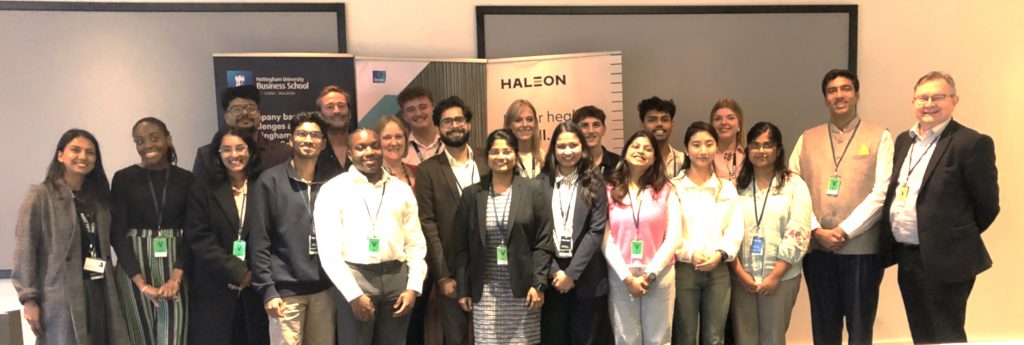November 14, 2024, by lizels
Dispensing Change: Students Rethink Pharmacy’s Role in Pain Management

The Business Project Module is an option for Masters students across most departments at Nottingham University Business School, bringing together students from various disciplines to work together on a business question. This year, our question came from the Expert Marketing team at Haleon, responsible for marketing its products through specialist groups such as pharmacists, dentists, and hygienists.
What is the purpose of the module?
The aim of the Business Module is to support students in understanding how to blend their grasp of theory with the practice of a live and pressing business challenge. The students were asked to find the right balance, prioritising the client’s question but drawing on academic learning to address this in a meaningful and impactful way.
The question posed to the students was:
‘How could we leverage the changing capabilities of pharmacies within the healthcare system to create a more accessible, efficient, and patient-centred approach to pain management?’
This was purposely a tough question – and a challenge at the heart of this was how this could provide value to the client in terms of supporting their brand purpose, driving sales or strengthening trust.
The Brief
We kicked off with a briefing led by our clients, Global Head of Expert Marketing – Laura Street, and Sarah Mills, Global Insight Manager in the team. They gave a 45-minute filmed interview with Colin to help set out the issues for the students, who then had a week to prepare for a live Q&A. The students were very engaged in this session, which was vital as we had set them a big challenge in quite a complex business setting (with a three-way relationship between Haleon, pharmacists, and pain patients).
To add to the briefing, we also had presentations with Q&A with senior Ipsos employees who work with Haleon – Keith Glasspoole, the Global Account Director; Jo Appleton, the Global Lead for Health; and Shaun Wilson, the lead for Shopper. These helped provide the students with expert perspectives they could use directly in their research. Colin had recently undertaken a similar project for Haleon in his role at Ipsos and was also available throughout the project to provide guidance on addressing the question. Gradually, students started to work together and unpack the client’s question. Many conducted their primary research, visiting local pharmacies to observe the store behaviours and how the pharmacists were able to interact with patients. In some cases, they also undertook interviews with pharmacists and patients.
The Pitch
The looming presentation dates of mid-August focused minds with a great deal of activity to come well prepared: calling on the support of UoN Council Member Rakesh Sharma at this point gave the students some much-needed energy with guidance on how to sharpen their pitches. There was a good audience for the presentations, including company representatives: this allowed for a diversity of comment and evaluation at this stage, as well as offering the students a suitably adrenaline-infused setting to present. They then completed the other coursework requirements, including personal reflections on their experience and a group report.
The students were enthusiastic to visit client premises. We decided to make this happen and use the occasion as an opportunity to mark the completion of the project, holding an awards ceremony with a certificate of completion and a trophy for the winning team. Haleon hosted the ceremony at their Weybridge offices, where students shared findings and learned about career opportunities at Haleon.
Feedback from students was positive. MSc Management student Sreyashee Kundu noted,
‘The teamwork and leadership skills of this module are invaluable. My group was diverse, with knowledge coming from many backgrounds. It was great to collaborate and work with them. My course modules were well aligned with the business project module and our group covered all factors of business strategy.’
To be a successful practitioner, it is essential to be able to abstract and conceptualise the challenge to address it properly and make change happen. In the challenging and turbulent environment we find ourselves in, this skill needs to be developed and reinforced, and experiential learning works well in delivering this. As we continue to develop and extend the Business Project Module, we will continue to work on instilling this ‘pracademic’ orientation.
Find out more about work integrated learning in Nottingham University Business School masters courses, including the Company based challenge, placements opportunities, and more.
Blog written by Colin Strong, Professor of Practice, Nottingham University Business School.
No comments yet, fill out a comment to be the first

Leave a Reply